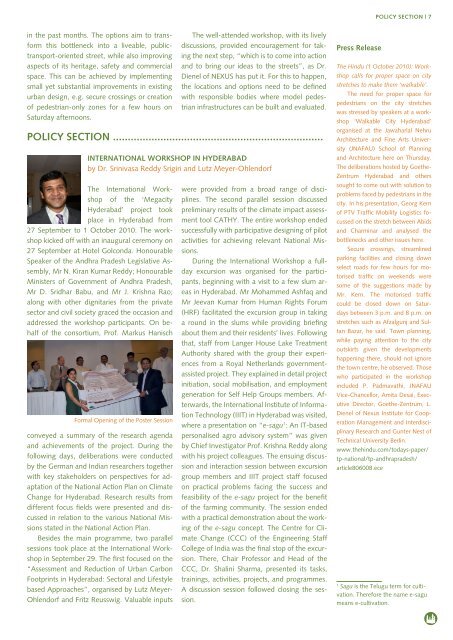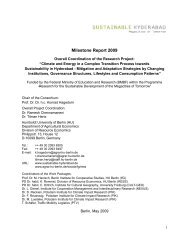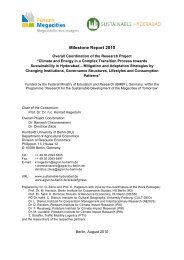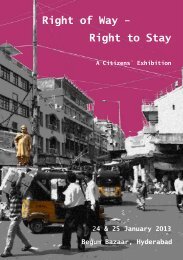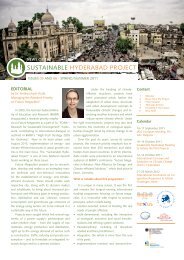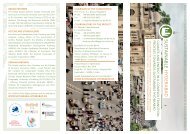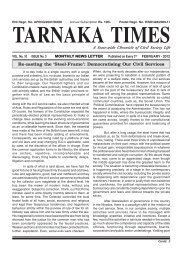SUSTAINABLE HYDERABAD PROJECT
SUSTAINABLE HYDERABAD PROJECT
SUSTAINABLE HYDERABAD PROJECT
You also want an ePaper? Increase the reach of your titles
YUMPU automatically turns print PDFs into web optimized ePapers that Google loves.
POLICY SECTION | 7<br />
in the past months. The options aim to transform<br />
this bottleneck into a liveable, publictransport-oriented<br />
street, while also improving<br />
aspects of its heritage, safety and commercial<br />
space. This can be achieved by implementing<br />
small yet substantial improvements in existing<br />
urban design, e.g. secure crossings or creation<br />
of pedestrian-only zones for a few hours on<br />
Saturday afternoons.<br />
POLICY SECTION ........................................................................<br />
INTERNATIONAL WORKSHOP IN <strong>HYDERABAD</strong><br />
by Dr. Srinivasa Reddy Srigiri and Lutz Meyer-Ohlendorf<br />
The International Workshop<br />
of the ‘Megacity<br />
Hyderabad’ project took<br />
place in Hyderabad from<br />
27 September to 1 October 2010. The workshop<br />
kicked off with an inaugural ceremony on<br />
27 September at Hotel Golconda. Honourable<br />
Speaker of the Andhra Pradesh Legislative Assembly,<br />
Mr N. Kiran Kumar Reddy; Honourable<br />
Ministers of Government of Andhra Pradesh,<br />
Mr D. Sridhar Babu, and Mr J. Krishna Rao;<br />
along with other dignitaries from the private<br />
sector and civil society graced the occasion and<br />
addressed the workshop participants. On behalf<br />
of the consortium, Prof. Markus Hanisch<br />
Formal Opening of the Poster Session<br />
conveyed a summary of the research agenda<br />
and achievements of the project. During the<br />
following days, deliberations were conducted<br />
by the German and Indian researchers together<br />
with key stakeholders on perspectives for adaptation<br />
of the National Action Plan on Climate<br />
Change for Hyderabad. Research results from<br />
different focus fields were presented and discussed<br />
in relation to the various National Missions<br />
stated in the National Action Plan.<br />
Besides the main programme, two parallel<br />
sessions took place at the International Workshop<br />
in September 29. The first focused on the<br />
“Assessment and Reduction of Urban Carbon<br />
Footprints in Hyderabad: Sectoral and Lifestyle<br />
based Approaches”, organised by Lutz Meyer-<br />
Ohlendorf and Fritz Reusswig. Valuable inputs<br />
The well-attended workshop, with its lively<br />
discussions, provided encouragement for taking<br />
the next step, “which is to come into action<br />
and to bring our ideas to the streets”, as Dr.<br />
Dienel of NEXUS has put it. For this to happen,<br />
the locations and options need to be defined<br />
with responsible bodies where model pedestrian<br />
infrastructures can be built and evaluated.<br />
were provided from a broad range of disciplines.<br />
The second parallel session discussed<br />
preliminary results of the climate impact assessment<br />
tool CATHY. The entire workshop ended<br />
successfully with participative designing of pilot<br />
activities for achieving relevant National Missions.<br />
During the International Workshop a fullday<br />
excursion was organised for the participants,<br />
beginning with a visit to a few slum areas<br />
in Hyderabad. Mr Mohammed Ashfaq and<br />
Mr Jeevan Kumar from Human Rights Forum<br />
(HRF) facilitated the excursion group in taking<br />
a round in the slums while providing briefing<br />
about them and their residents’ lives. Following<br />
that, staff from Langer House Lake Treatment<br />
Authority shared with the group their experiences<br />
from a Royal Netherlands governmentassisted<br />
project. They explained in detail project<br />
initiation, social mobilisation, and employment<br />
generation for Self Help Groups members. Afterwards,<br />
the International Institute of Information<br />
Technology (IIIT) in Hyderabad was visited,<br />
where a presentation on “e-sagu 1 : An IT-based<br />
personalised agro advisory system” was given<br />
by Chief Investigator Prof. Krishna Reddy along<br />
with his project colleagues. The ensuing discussion<br />
and interaction session between excursion<br />
group members and IIIT project staff focused<br />
on practical problems facing the success and<br />
feasibility of the e-sagu project for the benefit<br />
of the farming community. The session ended<br />
with a practical demonstration about the working<br />
of the e-sagu concept. The Centre for Climate<br />
Change (CCC) of the Engineering Staff<br />
College of India was the final stop of the excursion.<br />
There, Chair Professor and Head of the<br />
CCC, Dr. Shalini Sharma, presented its tasks,<br />
trainings, activities, projects, and programmes.<br />
A discussion session followed closing the session.<br />
Press Release<br />
The Hindu (1 October 2010): Workshop<br />
calls for proper space on city<br />
stretches to make them ‘walkable’.<br />
The need for proper space for<br />
pedestrians on the city stretches<br />
was stressed by speakers at a workshop<br />
‘Walkable City Hyderabad’<br />
organised at the Jawaharlal Nehru<br />
Architecture and Fine Arts University<br />
(JNAFAU) School of Planning<br />
and Architecture here on Thursday.<br />
The deliberations hosted by Goethe-<br />
Zentrum Hyderabad and others<br />
sought to come out with solution to<br />
problems faced by pedestrians in the<br />
city. In his presentation, Georg Kern<br />
of PTV Traffic Mobility Logistics focussed<br />
on the stretch between Abids<br />
and Charminar and analysed the<br />
bottlenecks and other issues here.<br />
Secure crossings, streamlined<br />
parking facilities and closing down<br />
select roads for few hours for motorised<br />
traffic on weekends were<br />
some of the suggestions made by<br />
Mr. Kern. The motorised traffic<br />
could be closed down on Saturdays<br />
between 3 p.m. and 8 p.m. on<br />
stretches such as Afzalgunj and Sultan<br />
Bazar, he said. Town planning,<br />
while paying attention to the city<br />
outskirts given the developments<br />
happening there, should not ignore<br />
the town centre, he observed. Those<br />
who participated in the workshop<br />
included P. Padmavathi, JNAFAU<br />
Vice-Chancellor, Amita Desai, Executive<br />
Director, Goethe-Zentrum, L.<br />
Dienel of Nexus Institute for Cooperation<br />
Management and Interdisciplinary<br />
Research and Gunter Nest of<br />
Technical University Berlin.<br />
www.thehindu.com/todays-paper/<br />
tp-national/tp-andhrapradesh/<br />
article806008.ece<br />
1<br />
Sagu is the Telugu term for cultivation.<br />
Therefore the name e-sagu<br />
means e-cultivation.


